Wear a handloom sari and help industry
By Gamini WARUSHAMANA
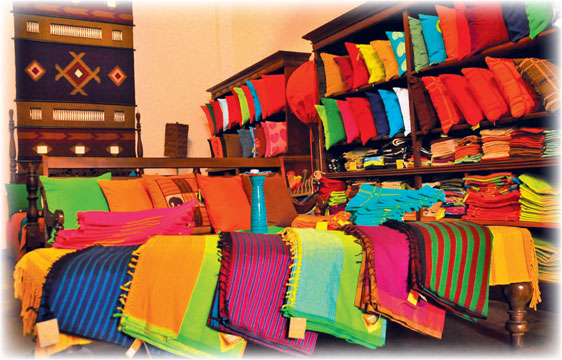 Weaving is one of the oldest industries in the world and the history
dates back to the early stage of human civilisation. According to some
historical and archaeological evidence weaving was known in the
paleolithic era. Sri Lankas textile industry too has a long history
which goes beyond 543 BC. According to the Mahawansa when the first
Sinhala king Vijaya arrived in Sri Lanka at Thammennawa the tribe
princess 'Kuweni', who later became the queen of the king, was spinning
cotton. Weaving is one of the oldest industries in the world and the history
dates back to the early stage of human civilisation. According to some
historical and archaeological evidence weaving was known in the
paleolithic era. Sri Lankas textile industry too has a long history
which goes beyond 543 BC. According to the Mahawansa when the first
Sinhala king Vijaya arrived in Sri Lanka at Thammennawa the tribe
princess 'Kuweni', who later became the queen of the king, was spinning
cotton.
Although technology has transformed, textile industry to power looms
and fully automated mills, still the weaving industry survives in many
parts of the world. In India it is one of the largest cottage industries
that accounts for 19 percent of its textile production. Prior to the
open economy being introduced in 1977 weaving was an important cottage
industry in Sri Lanka and thousands of rural people, specially women
depended on it for a living.
Today, the handloom industry in Sri Lanka is struggling to survive.
Only a few who secured a significant market segment and compete
aggressively with all modern imported textiles and garments survived and
have confidence of the future.
Selyn is one such brand name that has successfully captured a
significant share in Sri Lankan high end market as well as EU market in
some specialised products such as soft toys made of handloom.
Selyn is a fair-trade certified company and also among the top ten
fair trade certified companies in the hand loom sector. Selyn engages
with the traditional Sri Lankan community of hand loom weavers mainly in
the Kurunegala and Batticaloa district. The company has established nine
handloom workshops and five sewing and handwork workshops in villages in
the rural outskirts in these districts.
These workshops are mostly headed by former Selyn members who have
been unable to continue work in the main workshop in Wanduragala due to
various reasons, such as leaving young daughters or grandchildren at
home alone or helping their husbands in paddy cultivation which all part
and parcel of the life of a rural Sri Lankan woman. This model enables
rural artisans to be self-sufficient and also work within the comfort of
their own villages and homes, said the Managing Director of Selyn Sandra
Wanduragala said.
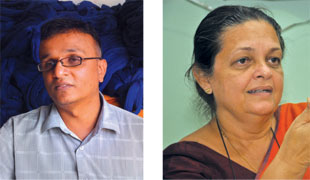 |
|
Samitha Wijerathne
Sandra Wanduragala |
Selyn showrooms are in Colombo and Wanduragala, Kurunegala on the
Colombo-Kurunegala main road while the weaving community is spread in
most of the rural villages in the district.
The showrooms also house a beautiful variety of handicrafts inspired
by Sri Lanka's traditional industries and modified to suit modern tastes
and trends. Creative products such as lampshades, papers and various
decorative products made of recycled handloom cut peaces shows the
company's commitment to be a truly fair trade certified company.
Sandra Wanduragala, a lawyer by profession re-launched the bankrupt
handloom business of her husband in 1991. Today she is the Managing
Director of Selyn and she recalled memories of her humble beginnings in
1991. "By the time I got involved I knew next to nothing on this
industry but I saw how these rural women suffer and wanted to launch a
social enterprise to help them and also work with them.
We started the enterprise with 15 women and thereafter my brother,
Hilary Wanduragala joined Selyn and now we have nearly 1,000 members
within our organisation working seasonally. This is a social enterprise
and we earn profits but hundreds of rural women too benefit".
With the Government support I got the opportunity to visit Europe and
understand the market. I have a knack for artistic work and I thought
that I can produce something different and marketable. Our products are
different with high quality and therefore expensive but can sell.
We are committed to quality and innovative designs and it is our
secret of success.
I can assure you that the quality of our products are well ahead of
products from China and India, she said.
Selyn has the control of the industry from fabric to the market and
it is one of the strengths of the company and a key to its success.
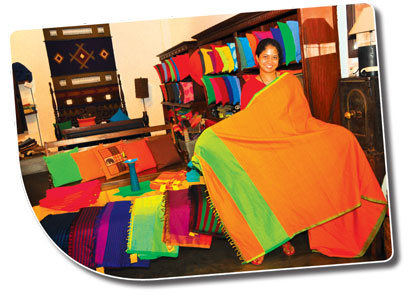 |
|
Selyn produsts at
Wanduragala show room Handloom |
The procurement manager of Selyn Samitha Wijerathne explained the
production cycle. We import cotton yarn from leading cotton producers in
India where we can get high quality yarn at a low price. The cleaning
and dyeing of yarn is done at our own facility.
In addition, we import mercerised cotton yarn which is smooth and
similar to silk yarn for expensive products.
As a Fair Trade certified company Selyn has to maintain strict
quality standards through out the production process. Therefore,
maintaining our own dyeing facility is important and we are highly
concerned about the chemicals we use. The company purchases dye from
reputed European suppliers which is very expensive compared to the dyes
used in the average handloom industry in Sri Lanka and samples of each
consignment is tested.
To comply with environmental aspects we have a waste water treatment
facility where the waste water of the dying facility is purified. All
these processes add costs to our products and therefore we have focused
on the specialised high end market, he said.
Wanduragala said that there are 10 principles to follow to comply
with Fair Trade Certification. Fair Trade is a trading partnership,
based on dialogue, transparency and respect, that seeks greater equity
in international trade. It contributes to sustainable development by
offering better trading conditions, securing the rights of marginalised
producers and workers. Our handloom garments, specially sarees are for
the local market and they cannot be exported. We have a range of 100
percent cotton handloom-based products such as curtains, bed sheets,
table mats, shirts and most of the leading hotels in the country are our
customers.
Since we have our own dyeing facility we can produce the exact
colours our customers want.
We have a soft toys manufacturing factory based on our handlooms and
95 percent of its products are exported to the EU. Selyn participate in
two trade fairs in Germany Nuremberg toy fair and Ambiente gift fair in
Frankfort every year, she said. Seetha Eakanayake, an experienced hand
loom designer in Mapegama,Kurunegala was an independent handloom
producer three years ago. As she failed to compete in the market she was
bankrupt and today she produces for the Selyn brand.
"Selyn provided me an interest free loan to settle debts and helped
me to restart my business. Today we purchase yarn and supply our
products to Selyn and we have a stable market.
I have been working in this industry for over 20 years and a present
20 women workers are working with me and have 14 machines", she said.
According to Ekanayake, the trade is not attractive for the younger
generation and almost all the women who work with Ekanayake are middle
aged. Lack of skilled labour is a serious issue and young girls prefer
to go to garment factories in the town. The reasons for low attraction
of young people is that the industry cannot generate sufficient income
for women. W.M.Somawathi who has three years experience in the trade
said that she can weave a saree or nearly six metres of handloom a day
but her daily income was only Rs.350 to Rs 400. Ramani Wijesinghe who
has 20-years' experience said that she can produce two metres extra and
earn Rs.500 to Rs 600 per day. But here the women have a flexible
working culture and they come to work after completing all the household
chores.
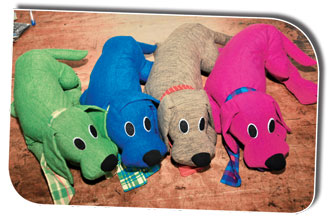 |
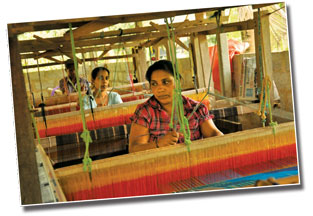 |
| Soft toys made of
handloom |
If you buy a handloom
sari you help one rural women. |
They go home for lunch and look after the children and return to
work. Wijesinghe said that the job is not too difficult. Men too are
working in the handloom industry and in the Batticaloa district there
are men who are engaged in this industry.
In India it is a male dominated industry. When asked about the future
of the industry? Wanduragala was positive and she said that with the
boom in the tourism industry, the demand will increase for handloom
products. Already there is an increase in demand and from 2008 due to
the recession in Europe, the demand for our toys in the EU declined by
42 percent. But with the end of terrorism, the demand for handloom
increased in the local market. The lack of textile designers is another
issue, while designers should introduce marketable products. For the
sustainability in the industry it should be a profitable business.
The wholesale supply of machinery to households will not help the
industry and all such efforts by government agencies and NGOs have
failed. All women can help the industry by wearing handloom saries.
If you buy a handloom sari remember that you help one rural woman. We
produce wedding saris as well and there is a growing demand for handloom
products, Wanduragala said.
|

